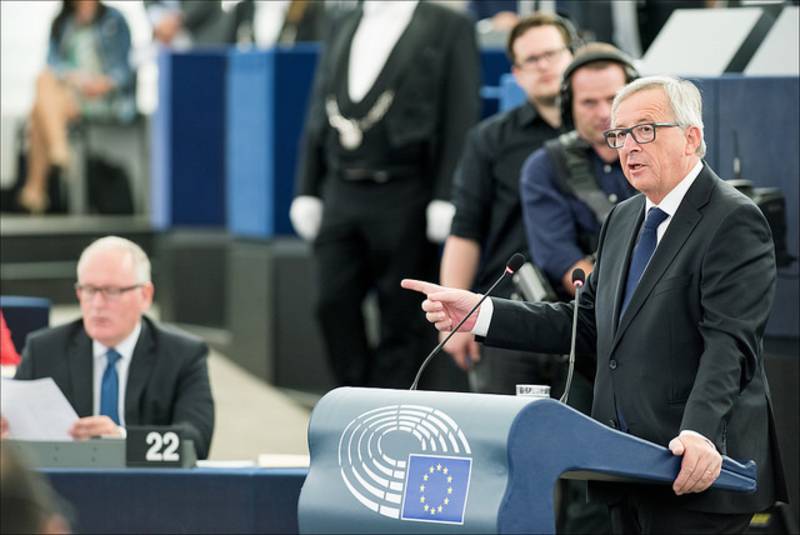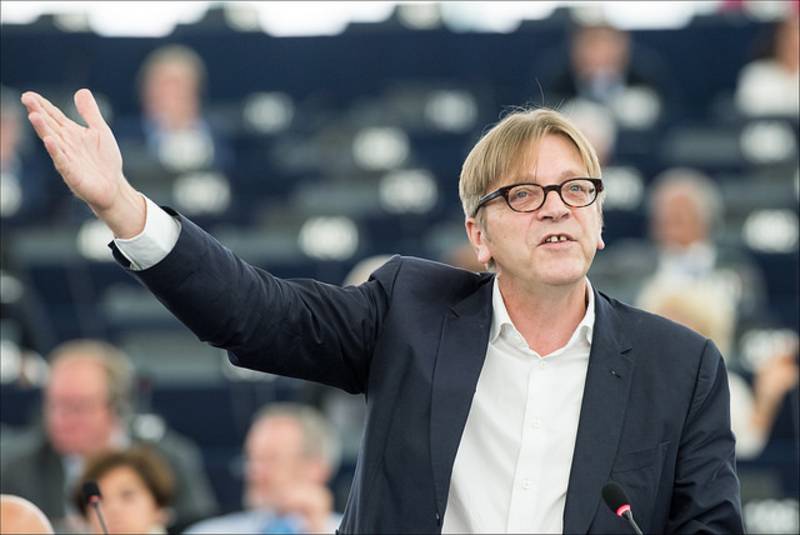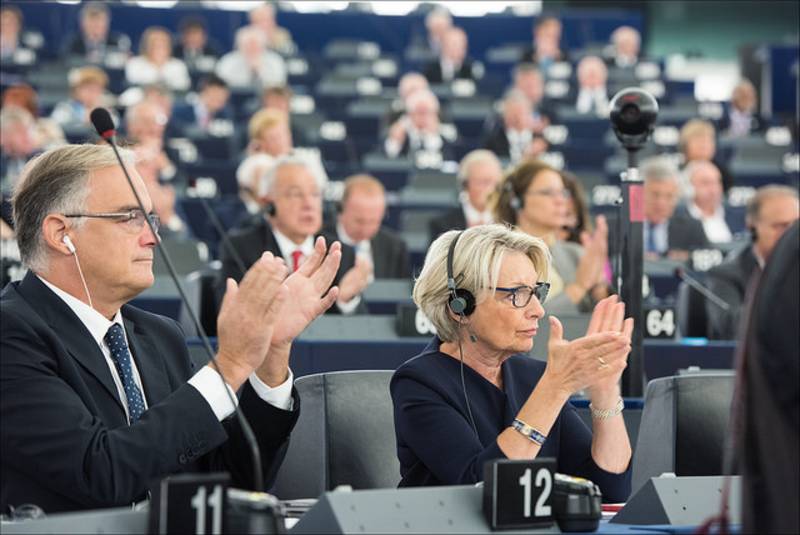Dude, Where's My Union?
Adelina Marini, September 11, 2015
 The state of the European Union is not good. Not only that but there is not enough Europe in it, or enough union. This is Jean-Claude Juncker’s assessment after a year at the head of the European Commission. The address was the longest to date not only because the state of the Union is heavy (meaning missing) on too many levels, but also because of poor planning of how it should be done. The plan was for Juncker to present after his address the new proposals of the EC for dealing with the migrant-refugee problem. It all turned into a big mess that went on for several hours. Although there were some quite strong messages in his speech, the end result was very well summarised by Politico Europe – a wide variety of accents in European media.
The state of the European Union is not good. Not only that but there is not enough Europe in it, or enough union. This is Jean-Claude Juncker’s assessment after a year at the head of the European Commission. The address was the longest to date not only because the state of the Union is heavy (meaning missing) on too many levels, but also because of poor planning of how it should be done. The plan was for Juncker to present after his address the new proposals of the EC for dealing with the migrant-refugee problem. It all turned into a big mess that went on for several hours. Although there were some quite strong messages in his speech, the end result was very well summarised by Politico Europe – a wide variety of accents in European media.
Juncker attempted to use the migrant-refugee crisis to show one of many things that are wrong in the EU and as a result two debates were held on migration and many of the other important issues to the Union had to be dropped from his address to MEPs in Strasbourg and the debate itself. The full text, however, helps fill in the gaps. Our attitude toward the refugees revealed the total lack of unity as this website published many times. The rift, however, is much older – the Greek crisis, which for the first time this summer placed doubt in the Euro’s irreversibility. That’s why it is by no coincidence that Juncker chose Greece as the second most important European problem. This was the crisis that held the entire Union in check, and at certain moments there was a threat of checkmate. Dozens of Eurogroup and European Council meetings were held with several records broken, like three Eurogroup meetings and two summits in one week.
Juncker reminded that at the beginning of the year the talks on Greece have tried more than once the extent of Europe’s patience. “A lot of time and a lot of trust was lost. Bridges were burnt. Words were said that cannot easily be taken back”, he said and concluded: “I am not proud of every aspect of the results achieved.” In his opinion, the failure to present a rapid and clear solution to the Greek crisis weakened everyone.
The third problem that shows lack of Europe is the euro area itself as a structure. Reminding the ideas put forward in the five presidents’ report, Juncker made a commitment to the European Parliament that by the end of the year the EC will present a plan for a pan-European scheme for guaranteeing deposits, which is to be independent from “governments’ purses”. As a former supporter of the idea of Eurobonds, also known as debt mutualisation, Juncker announced that in the following weeks proposals will be presented for a system of reinsurance. In his words, this will not be complete mutualisation, but rather a new approach.
The EC will be working on another idea from the presidents’ report – a common representation of the euro area in international financial institutions. Here came one of the strongest criticisms of Juncker towards member states. After showing his bewilderment at the fact that it is possible the euro area, which has the second largest currency in the world, to still not speak with one voice on economic matters in international institutions. “How can it be that a strategically important new Infrastructure Investment Bank is created in Asia, and European governments, instead of coordinating their efforts, engage in a race who is first to become a member?”, asked the Commission leader. We need to grow up and put our common interests ahead of our national ones, he said. He feels the President of the Eurogroup is the natural spokesperson for the euro area in international financial institutions such as the IMF. At the moment, Eurogroup President is Dutch Minister of Finance Jeroen Dijsselbloem, who was elected for a second term at the post in June.
Juncker also supports the idea of setting up a Euro Area Treasury, which is accountable at European level. A good basis for it would be the permanent bailout fund of the Eurozone – the European Stability Mechanism, created during the crisis with a potential credit volume of €500 billion. And because he said that while thinking about the future of the European project the United Kingdom was in his mind all the time, the latest publication of the British think-tank Open Europe, which positioned itself over the last two years as a guide to British policy towards the EU, arrived just in time. In the text, there are several proposals for the future of the euro area, which could hardly be seen as complementary to the ideas outlined in the five presidents’ report.
 Joining the euro area to stop being compulsory is one of the proposals. At the moment, all member states that have not negotiated opt-outs, are bound to join the euro when they are ready. There are no deadlines set, but at the peak of the debt crisis in the Eurozone some new members like the Czech Republic and Poland voiced opinions towards voluntariness. At the moment, only Great Britain and Denmark have permanent opt-outs from the obligation to join the single currency. The second proposal of Open Europe is to give new voting rights to countries outside the euro area, in order to avoid a situation where all sharing the common currency make up a majority in voting a certain proposal. That would put the ones outside the euro to a disadvantage.
Joining the euro area to stop being compulsory is one of the proposals. At the moment, all member states that have not negotiated opt-outs, are bound to join the euro when they are ready. There are no deadlines set, but at the peak of the debt crisis in the Eurozone some new members like the Czech Republic and Poland voiced opinions towards voluntariness. At the moment, only Great Britain and Denmark have permanent opt-outs from the obligation to join the single currency. The second proposal of Open Europe is to give new voting rights to countries outside the euro area, in order to avoid a situation where all sharing the common currency make up a majority in voting a certain proposal. That would put the ones outside the euro to a disadvantage.
Juncker did not say anything new about London’s demands to re-negotiate its relations with Brussels and a reform of the EU, but the fact that he did mention this issue shows that this is one more of the Union's sore spots. Juncker, who was in a rather strained relationship with British Prime Minister David Cameron as the latter was against his appointment as head of the European Commission, reiterated his commitment to strive for a fair deal with Britain, led by the presumption that the UK remaining a part of the Union is better for everyone.
The other sphere lacking a union, from the start at that, is foreign relations. “If we want to promote a more peaceful world, we will need more Europe and more Union in our foreign policy”, he said, accenting heavily on the Ukraine, for which he mentioned he would need a whole separate speech. From the podium in Strasbourg he sent a strong, even provocative message to Russia by stating that the Baltic states, which he confused with the Balkan states, and Poland are “untouchable. I want this to be understood very clearly in Moscow.” The boss of the EC also said that the EU must demonstrate to Russia what the price of confrontation is but it should also make it very clear that it is ready to engage. Quite strong rhetoric, keeping in mind the EU has no army of its own and has to depend upon NATO (most EU members are members of NATO as well) for the protection of the “untouchables” in the case of danger. His statement on foreign policy had a mostly symbolic role, rather than suggesting real actions.
The lack of union in terms of foreign policy, however, is again showing clearly. At the moment, several member states are considering military actions in Syria, while others are strongly opposed. This in itself is nothing new for the EU, it is even quite normal. The trouble is that this is not discussed in the Council. One of the refreshing ideas heard in the European Parliament on Wednesday morning came not from Juncker but from Liberals leader Guy Verhofstadt (Belgium). He voiced his regret that the leaders of the 28 member states had not been invited to participate in the debate. He said it in the context of the migrant-refugee crisis but, actually, the lack of coordination and discussion on such crucial national decisions like a military involvement in Syria is the main reason for the current segmentation of the Union with some states (mainly Eastern) say they have no responsibility for the Middle East crisis but are most affected by its consequences.
In the spirit of lack of union in the EU is also Juncker’s assessment of the results from the intergovernmental approach, which became more frequent over recent years. At the end of his planned speech, which there was not enough time for on Wednesday, he mentioned some of the key intergovernmental decisions that produced no results. One of these is the fiscal compact agreed on in 2011. Today, there is not a single member state that adheres strictly to the compact. Another intergovernmental decision is the formation of a fund  for bank restructuring, ratified by only four of total 19 members of the euro area. All this given that the fund is supposed to start work on January 1st.
for bank restructuring, ratified by only four of total 19 members of the euro area. All this given that the fund is supposed to start work on January 1st.
Juncker’s address was applauded loudly by MEPs on several occasions. The problem, however, is that the lack of union is not in Brussels or Strasbourg, but rather in the capitals. And if the idea for the presence of the 28 Prime Ministers and Presidents at a EP debate sounds unrealistic, the absence of European Council President Donald Tusk was duly noted, regardless of the legitimate reason for it – a visit to the Middle East.
The conclusions about lack of enough Europe in the addresses of EC leaders are nothing new. The address on the state of the Union was instituted by the previous EC boss José Manuel Barroso in his second term. In 2011, for example, he was also drawing a bleak picture of the state of the Union. A year later, he was again bluntly straightforward and urged for a new direction. And in 2013, he directly attacked the member states for lacking enough union and enough Europe. This year shows that Juncker inherited the same problems if not worse – less and less union in the Union. This is rather a paradox at the background of the radical change – for the first time the boss of the EC was voted on in elections and launched the first political Commission. Will this inject more union? Unlikely.
Translated by Stanimir Stoev
 Federica Mogherini | © Council of the EU
Federica Mogherini | © Council of the EU | © Council of the EU
| © Council of the EU Luis De Guindos | © Council of the EU
Luis De Guindos | © Council of the EU